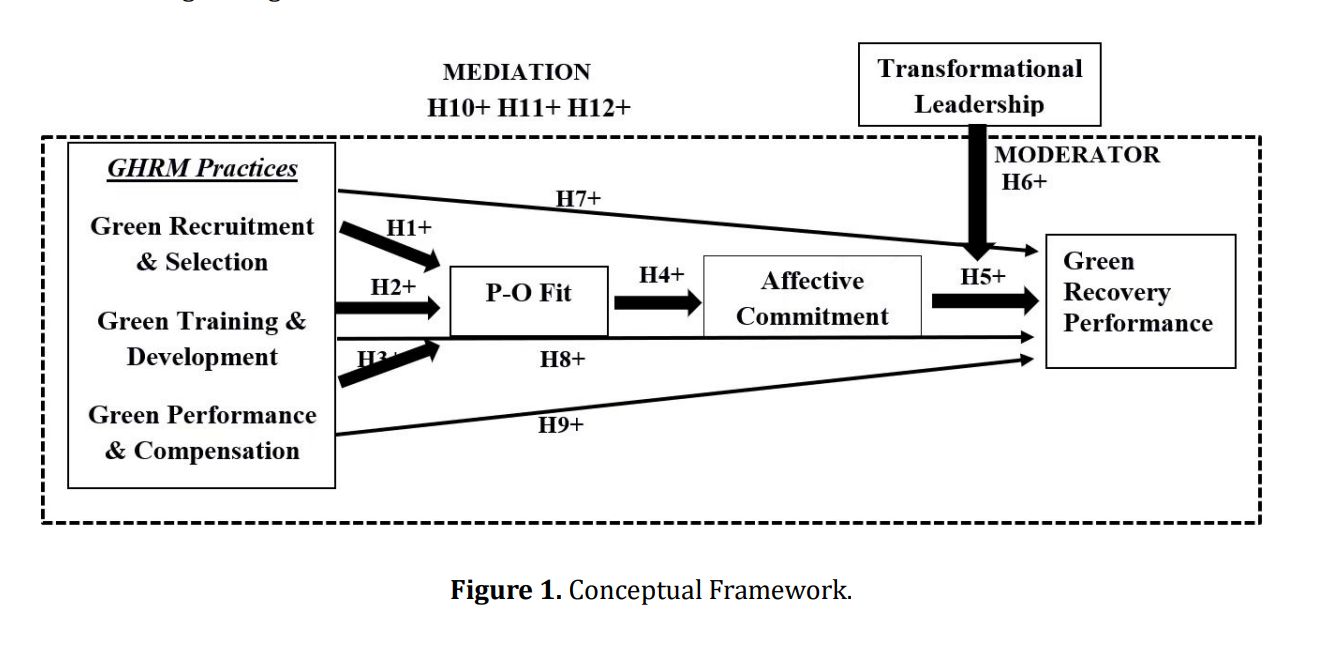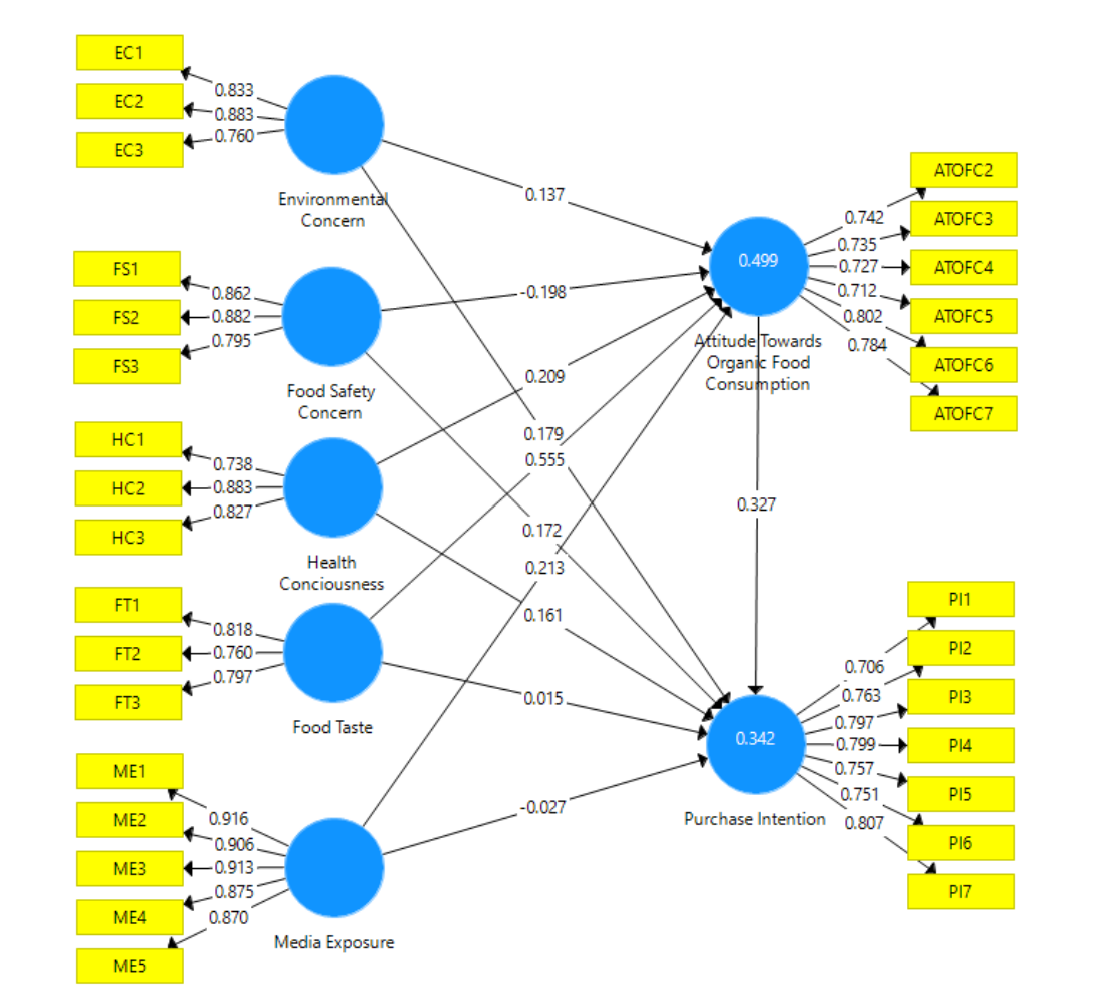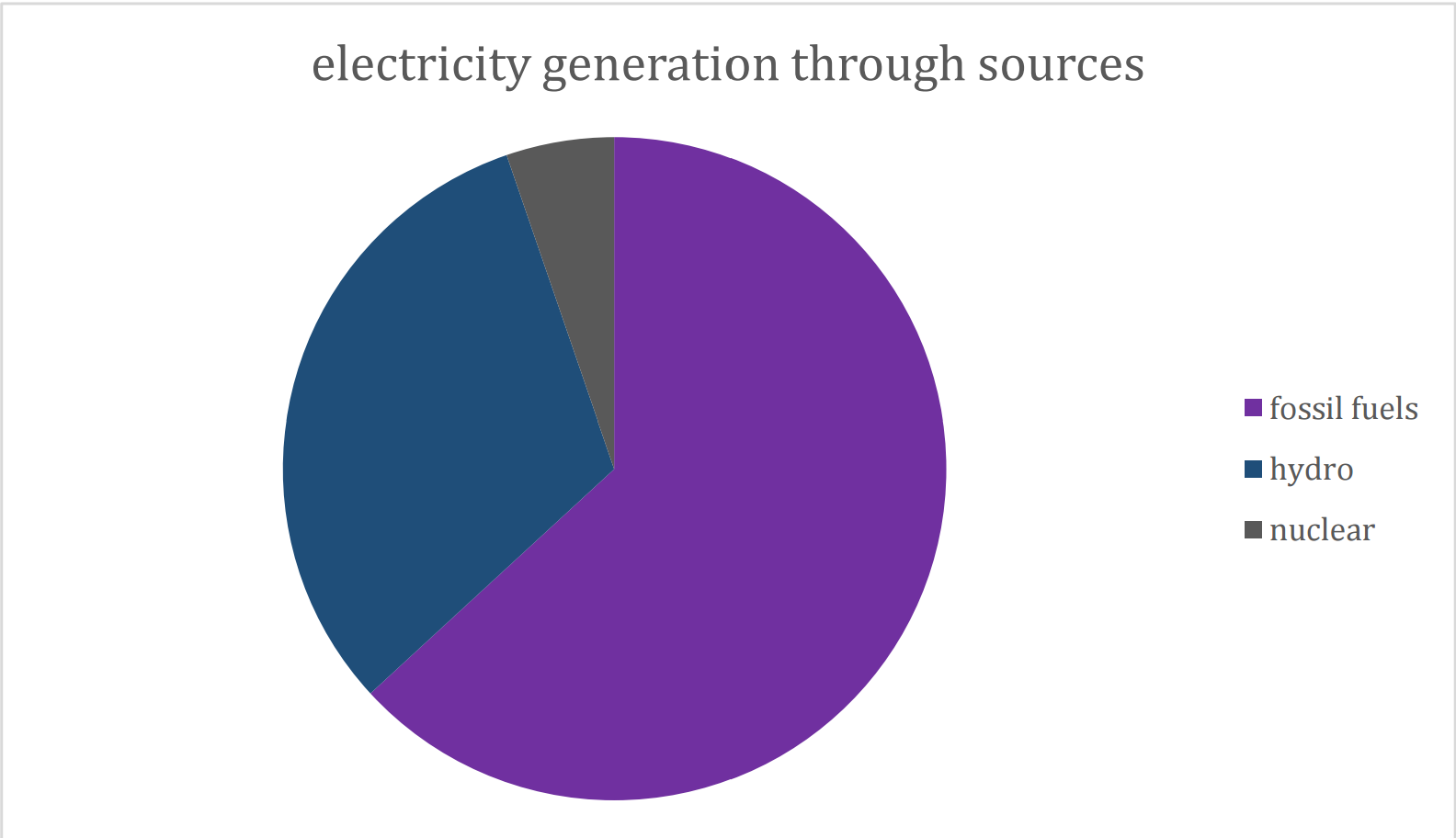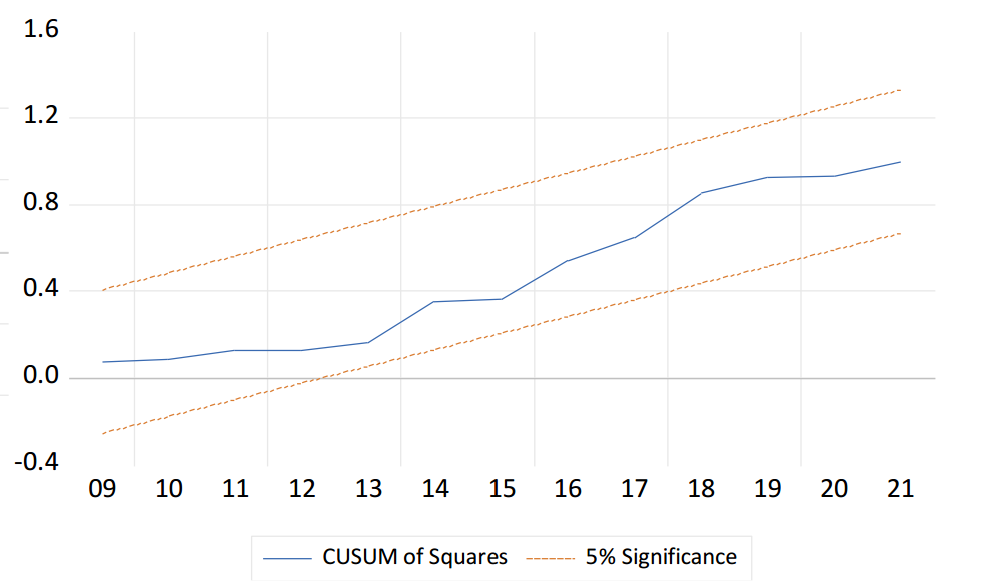Investigating the Influence of Factors on Attitude Towards Organic Food
Abstract
The purpose of the study is to determine the relationships between the factors, attitude towards food consumption and green purchase intention in organic food markets of Pakistan. A Total of 301 sample data was analyzed by SPSS and PLS-SEM. These statistical techniques were used to test the hypotheses. The study was supported the theories include theory of Reasoned Action, Planned Behavior, and expectancy-value model of attitude theory. It also enhances the intention of purchase to buy organic food. The study found that environment, consciousness of health, and safeties of food have significantly direct and indirect influence on Intention of purchase while, taste of food, and exposure of media only have significantly indirect effect on Intention of purchase. The study recommended that retailers should advertise organic food via social media or channels as media persuasively increase the chances to grab the consumer attention to buy the product.
Show Figures
Share and Cite
Article Metrics
References
- Ahmed, N., Li, C., Khan, A., Qalati, S. A., Naz, S., & Rana, F. (2021). Purchase intention toward organic food among young consumers using theory of planned behavior: role of environmental concerns and environmental awareness. Journal of Environmental Planning and Management, 64(5), 796-822.
- Al-Maroof, R. A. S., & Al-Emran, M. (2018). Students Acceptance of Google Classroom: An Exploratory Study using PLS-SEM Approach. International Journal of Emerging Technologies in Learning (iJET), 13(06), 112. doi:10.3991/ijet.v13i06.8275.
- Ayyub, S., Asif, M., & Nawaz, M. A. (2021). Drivers of organic food purchase intention in a developing country: the mediating role of trust. SAGE Open, 11(3), 21582440211045076.
- Bagher, A. N., Salati, F., & Ghaffari, M. (2018). Factors affecting intention to purchase organic food products among Iranian consumers. Academy of Marketing Studies Journal, 22(3), 1-23.
- Brick, C. and Lai, C.K. (2018), “Explicit (but not implicit) environmentalist identity predicts pro-environmental behavior and policy preferences”, Journal of Environmental Psychology, Vol. 58, pp. 8-17.
- Çabuk, S., Tanrikulu, C., & Gelibolu, L. (2014). Understanding organic food consumption: attitude as a mediator. International Journal of consumer studies, 38(4), 337-345.
- Chakraborty, D., & Dash, G. (2022). Using the consumption values to investigate consumer purchase intentions towards natural food products. British Food Journal(ahead-of-print).
- Chakraborty, D., Siddiqui, A., Siddiqui, M., & Alatawi, F. M. H. (2022). Exploring consumer purchase intentions and behavior of buying ayurveda products using SOBC framework. Journal of Retailing and Consumer Services, 65, 102889.
- Chen, Y. S., Chang, T. W., Li, H. X., & Chen, Y. R. (2020). The influence of green brand affect on green purchase intentions: The mediation effects of green brand associations and green brand attitude. International Journal of Environmental Research and Public Health, 17(11), 4089.
- Chin, W. W. (1998). The partial least squares approach to structural equation modeling. Modern methods for business research, 295(2), 295-336.
- Chu, K. M. (2018). Mediating influences of attitude on internal and external factors influencing consumers’ intention to purchase organic foods in China. Sustainability, 10(12), 4690.
- Fang, W. C. (2018). International Journal of Future Generation Communication and Networking Foreword. In (Vol. 11, pp. V-VI): SCIENCE & ENGINEERING RESEARCH SUPPORT SOC RM 402, MAN-JE BLDG, 449-8 OJUNG.
- Fornell, C. G., & Larcker, D. F. (1981). Evaluating structural equation models with unobservable variables and measurement error. Journal of Marketing Research, 18(1), 39-50.
- Hair, J. F., Celsi, M., Ortinau, D. J., & Bush, R. P. (2010). Essentials of marketing research 2.
- Hair, J. F., Ringle, C. M., & Sarstedt, M. (2011). PLS-SEM: indeed a silver bullet. Journal of Marketing Theory and Practice, 19(2), 139-151.
- Hair, J. F., Ringle, C. M., & Sarstedt, M. (2013). Partial least squares structural equation modeling: Rigorous applications, better results and higher acceptance. Long range planning, 46(1-2), 1-12.
- Hair, J. F., Risher, J. J., Sarstedt, M., & Ringle, C. M. (2019). When to use and how to report the results of PLS-SEM. European Business Review, 31(1), 2-24. doi:10.1108/ebr-11-2018-0203.
- Hair, J. F., Sarstedt, M., & Ringle, C. M. (2019). Rethinking some of the rethinking of partial least squares. European Journal of Marketing, Forthcoming.
- Hair, J. F., Sarstedt, M., Hopkins, L., & Kuppelwieser, V. G. (2014). Partial least squares structural equation modeling (PLS-SEM): an emerging tool in business research. European Business Review, 26(2), 106-121.
- Hazaea, S. A., Al-Matari, E. M., Zedan, K., Khatib, S. F., Zhu, J., & Al Amosh, H. (2022). Green Purchasing: Past, Present and Future. Sustainability, 14(9), 5008.
- Henseler, J., Hubona, G., & Ray, P. A. (2016). Using PLS path modeling in new technology research: updated guidelines. Industrial management & data systems.
- Henseler, J., Ringle, C. M., & Sinkovics, R. R. (2009). The use of partial least squares path modeling in international marketing. In New challenges to international marketing. Emerald Group Publishing Limited.
- Hsu, S. Y., Chang, C. C., & Lin, T. T. (2018). Triple bottom line model and food safety in organic food and conventional food in affecting perceived value and purchase intentions. British food journal.
- Iqbal, J., Yu, D., Zubair, M., Rasheed, M. I., Khizar, H. M. U., & Imran, M. (2021). Health consciousness, food safety concern, and consumer purchase intentions toward organic food: The role of consumer involvement and ecological motives. SAGE Open, 11(2), 21582440211015727.
- Jang, H.-W., & Cho, M. (2022). The relationship between ugly food value and consumers’ behavioral intentions: Application of the Theory of Reasoned Action. Journal of Hospitality and Tourism Management, 50, 259-266.
- Kurniawan, A. S., Widowati, R., & Handayani, S. D. (2022). Integration of the Theory of Reasoned Action (TRA) on Hotel Room Repurchase Intention using Online Hotel Room Booking Applications. Jurnal Manajemen Teori dan Terapan| Journal of Theory and Applied Management, 15(1), 77-90.
- Lavuri, R., Jabbour, C. J. C., Grebinevych, O., & Roubaud, D. (2022). Green factors stimulating the purchase intention of innovative luxury organic beauty products: implications for sustainable development. Journal of Environmental Management, 301, 113899.
- Li, L., Wang, Z., Li, Y., & Liao, A. (2021). Consumer innovativeness and organic food adoption: The mediation effects of consumer knowledge and attitudes. Sustainable Production and Consumption, 28, 1465-1474.
- Liu, C., Yao, X., Zheng, Y., Zhu, Y., & Cao, D. (2022). Organic foods purchase intention, food safety information, and information on organic foods: Value orientations as a mediator. Social Behavior and Personality: an international journal, 50(4), 1-13.
- Najib, M., Sumarwan, U., Septiani, S., Waibel, H., Suhartanto, D., & Fahma, F. (2022). Individual and socio-cultural factors as driving forces of the purchase intention for organic food by middle class consumers in Indonesia. Journal of International Food & Agribusiness Marketing, 34(3), 320-341.
- Nguyen, T. T. H., Yang, Z., Nguyen, N., Johnson, L. W., & Cao, T. K. (2019). Greenwash and green purchase intention: The mediating role of green skepticism. Sustainability, 11(9), 2653.
- Pham, T. H., Nguyen, T. N., Phan, T. T. H., & Nguyen, N. T. (2018). Evaluating the purchase behaviour of organic food by young consumers in an emerging market economy. Journal of Strategic Marketing, 27(6), 540-556. doi:10.1080/0965254x.2018.1447984.
- Pino, G., Peluso, A. M., & Guido, G. (2012). Determinants of Regular and Occasional Consumers' Intentions to Buy Organic Food. Journal of Consumer Affairs, 46(1), 157-169. doi:10.1111/j.1745-6606.2012.01223.x.
- Qader, I. K. A., & Zainuddin, Y. B. (2011). The impact of media exposure on intention to purchase green electronic products amongst lecturers. International Journal of Business and Management, 6(3), 240.
- Qomariah, A., & Prabawani, B. (2020). The Effects of Environmental Knowledge, Environmental Concern, and Green Brand Image on Green Purchase Intention with Perceived Product Price and Quality as the Moderating Variable. IOP Conference Series: Earth and Environmental Science, 448(1), 012115. doi:10.1088/1755-1315/448/1/012115.
- Radojević, V., Tomaš Simin, M., Glavaš Trbić, D., & Milić, D. (2020). A Profile of Organic Food Consumers—Serbia Case-Study. Sustainability, 13(1), 131. doi:10.3390/su13010131.
- Rana, J., & Paul, J. (2017). Consumer behavior and purchase intention for organic food: A review and research agenda. Journal of Retailing and Consumer Services, 38, 157-165. doi:10.1016/j.jretconser.2017.06.004.
- Saleem, A., Aslam, J., Kim, Y. B., Nauman, S., & Khan, N. T. (2022). Motives towards e-Shopping Adoption among Pakistani Consumers: An Application of the Technology Acceptance Model and Theory of Reasoned Action. Sustainability, 14(7), 4180.
- Sarstedt, M., Hair, J. F., Ringle, C. M., Thiele, K. O., & Gudergan, S. P. (2016). Estimation issues with PLS and CBSEM: where the bias lies. Journal of Business Research,, 69(10), 3998-4010.
- Schaufele, I., & Janssen, M. (2021). How and Why Does the Attitude-Behavior Gap Differ Between Product Categories of Sustainable Food? Analysis of Organic Food Purchases Based on Household Panel Data. Front Psychol, 12, 595636. doi:10.3389/fpsyg.2021.595636.
- Shahabi Ahangarkolaee, S., & Gorton, M. (2020). The effects of perceived regulatory efficacy, ethnocentrism and food safety concern on the demand for organic food. International Journal of Consumer Studies, 45(2), 273-286. doi:10.1111/ijcs.12619
- Su, Y., Khaskheli, A., Raza, S. A., & Yousufi, S. Q. (2022). How health consciousness and social consciousness affect young consumers purchase intention towards organic foods. Management of Environmental Quality: An International Journal, (ahead-of-print).
- Syadzwina, M. N., & Astuti, R. D. (2021, March). Linking green skepticism to green purchase behavior on personal care products in Indonesia. In IOP Conference Series: Earth and Environmental Science (Vol. 716, No. 1, p. 012045). IOP Publishing.
- Talwar, S., Jabeen, F., Tandon, A., Sakashita, M., & Dhir, A. (2021). What drives willingness to purchase and stated buying behavior toward organic food? A Stimulus–Organism–Behavior–Consequence (SOBC) perspective. Journal of Cleaner Production, 293, 125882. doi:10.1016/j.jclepro.2021.125882.
- Tandon, A., Dhir, A., Kaur, P., Kushwah, S., & Salo, J. (2020). Behavioral reasoning perspectives on organic food purchase. Appetite, 154, 104786.
- Tandon, A., Jabeen, F., Talwar, S., Sakashita, M., & Dhir, A. (2021). Facilitators and inhibitors of organic food buying behavior. Food Quality and Preference, 88, 104077. doi:10.1016/j.foodqual.2020.104077.
- Wang, D., Weisstein, F. L., Duan, S., & Choi, P. (2022). Impact of ambivalent attitudes on green purchase intentions: The role of negative moods. International Journal of Consumer Studies, 46(1), 182-199.
- Wong, W. M., & Tzeng, S. Y. (2021). Mediating role of organic labeling awareness and food safety attitudes in the correlation between green product awareness and purchase intentions. SAGE Open, 11(4), 21582440211061565.
- Yang, X., Jiang, J., & Chen, S. C. (2022). Achieving sustainability: Determinants of conscious green purchasing behavior during the COVID‐19 pandemic. Business Strategy and the Environment.
- Zahan, I., Chuanmin, S., Fayyaz, M., & Hafeez, M. (2020). Green purchase behavior towards green housing: an investigation of Bangladeshi consumers. Environmental Science and Pollution Research, 27(31), 38745-38757.
- Zameer, H., & Yasmeen, H. (2022). Green innovation and environmental awareness driven green purchase intentions. Marketing Intelligence & Planning, (ahead-of-print).



